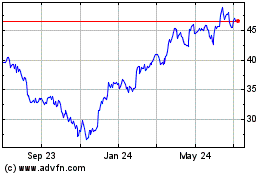By James R. Hagerty
After failing as the owner of Bonanza steakhouses in Detroit in
the 1980s, Ronald Hall Sr. bounced back to found and run
Bridgewater Interiors LLC, a maker of car seats that was No. 3
among U.S. black-owned companies ranked by Black Enterprise in
2015.
Bridgewater, a joint venture of Johnson Controls Inc. and
investors led by Mr. Hall, survived the severe auto sales slump of
2008 and 2009. It now has four U.S. plants and plans to open one in
Mexico. The seat maker, whose customers include General Motors Co.,
Ford Motor Co. and Honda Motor Co., had sales of about $2.1 billion
last year.
Mr. Hall, who had degrees in math and business, became a role
model for African-American entrepreneurs.
He died of a brain tumor on June 1 at age 72.
Ronald E. Hall was born Sept. 4, 1943, in Detroit. His father
worked at a Ford factory and later was a credit union officer. His
mother was a civil servant.
The young Ronald played center field on his high-school baseball
team and attracted attention from scouts. He hoped to play baseball
for Western Michigan University when he enrolled there in the early
1960s, but was advised against it because the team played and
stayed overnight in some places where black players wouldn't be
welcome, said his son, Ron Hall Jr., now CEO of Bridgewater
Interiors. That snub "stayed with him," his son said, adding that
his father remained "an eternal optimist."
He earned a math degree at Western Michigan and a master's in
business administration at Wayne State University. He then worked
as a computer systems analyst at Ford. As a sideline, he coached
basketball at Schoolcraft College in Livonia, Mich.
In 1980, he bought a Bonanza steakhouse franchise in Dearborn,
just outside of Detroit. His 11-year-old son, Ron Jr., was baffled:
Why would his father forsake a blue-chip employer like Ford and the
high-tech world of computers to run a chain restaurant?
"He said he wanted to be his own boss and someday I would
understand," said Ron Jr., who soon got experience mopping floors
at Bonanza before graduating from West Point and getting a law
degree at the University of Michigan.
The elder Mr. Hall opened a second Bonanza steakhouse in
Detroit's central west side.
One of his early hires at Bonanza was Hoy Monk, who had played
basketball for Coach Hall at Schoolcraft. Mr. Monk started as a
dishwasher but told Mr. Hall, "I can see myself running this
place." Within six months, he was promoted to manager. When he
first started at Bonanza, Mr. Monk didn't have a car, so Mr. Hall
co-signed a loan allowing him to buy one.
Dwayne Richardson, a friend of Mr. Monk, recalls meeting Mr.
Hall on one of his first days working at Bonanza. "I was burning
steaks left and right," Mr. Richardson recalled. "He just shook his
head and walked away." Eventually, though, Mr. Richardson's skills
improved.
Mr. Hall -- 6-foot-1, well-dressed, carrying a briefcase --
became Mr. Richardson's role model. "This is the guy I want to be,"
Mr. Richardson recalled thinking. He now works as a senior systems
analyst at Blue Cross Blue Shield of Michigan.
Crime was a problem at Bonanza in Detroit. The restaurant was
robbed several times. A bigger problem was that Americans began
eating less red meat. Mr. Hall closed the restaurants and declared
bankruptcy in the late 1980s.
With four sons to feed, he found work as a vice president at New
Detroit, a nonprofit that supports minority-owned businesses. In
1993, he became chief executive of the Michigan Minority Business
Development Council. There he met board members from big companies
including General Motors and Johnson Controls.
GM and other auto makers were trying to do more business with
minority-owned businesses. That motivated Johnson Controls, which
makes car seats and other products, to seek partners. Mr. Hall was
invited to form a joint venture with Johnson Controls.
Initially, Mr. Hall was reluctant, his son said, because he
enjoyed running the business development council and was doing well
there. Setting up Bridgewater meant taking big financial risks. He
had to mortgage his home to raise money for his share of the
equity. But he saw it as an obligation and wanted to show it was
possible to make top-quality components with an inner-city
workforce, the younger Mr. Hall said.
The Bridgewater joint venture, set up in 1998, has turned into a
"crown jewel," said Byron Foster, an executive vice president at
Johnson Controls and board member at Bridgewater. Mr. Hall "really
built something bigger than himself that's sustainable for the long
term."
Mr. Hall was calm and good at communicating with workers, Mr.
Foster said. The CEO also loved talking about baseball. Almost
every board meeting included a brief discussion "about the state of
the Tigers," Mr. Foster said.
Alex Parrish, his lawyer, recalled Mr. Hall's way of urging
people not to overcomplicate things: "Don't make easy hard."
"He was a great listener," Mr. Parrish said. "He would take the
time to understand what was really important to the people he was
dealing with."
In 2007, Mr. Hall had surgery for a tumor and lost the ability
to open his right eye. "I don't have any pity parties over it," he
said in an interview. "It could have been so much worse."
Write to James R. Hagerty at bob.hagerty@wsj.com
(END) Dow Jones Newswires
June 10, 2016 13:13 ET (17:13 GMT)
Copyright (c) 2016 Dow Jones & Company, Inc.
General Motors (NYSE:GM)
Historical Stock Chart
From Mar 2024 to Apr 2024

General Motors (NYSE:GM)
Historical Stock Chart
From Apr 2023 to Apr 2024
